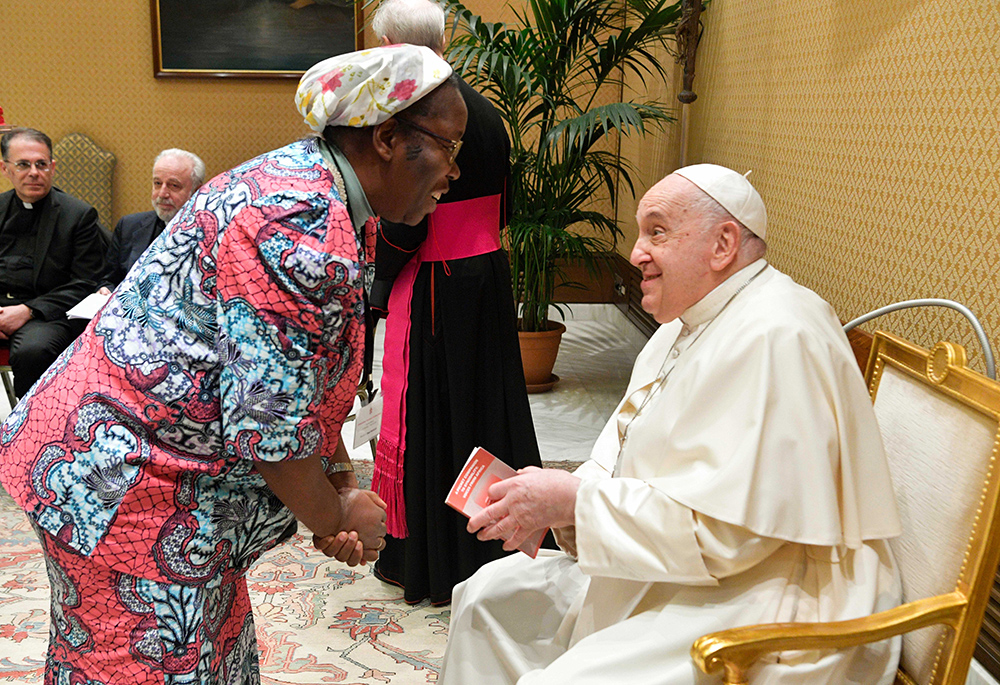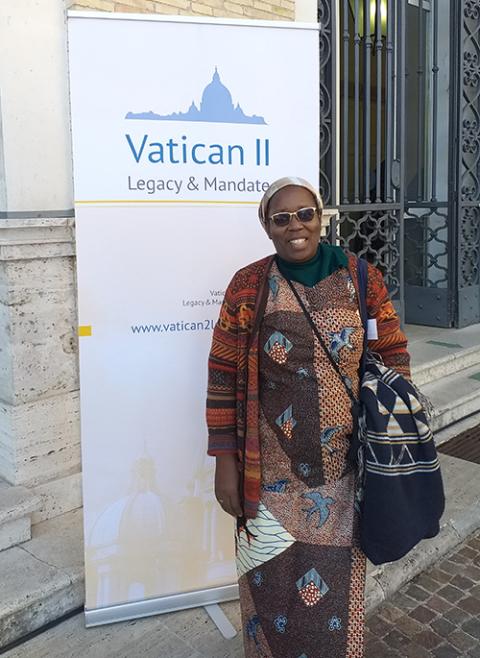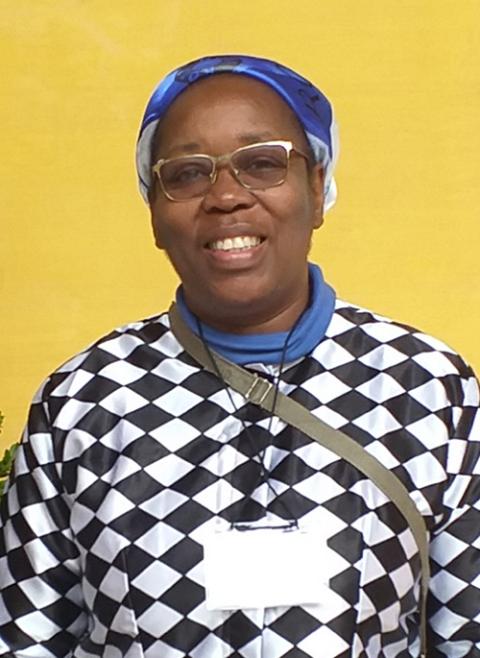
Pope Francis greets Congolese Sr. Josée Ngalula, a Sister of St. Andrew and one of five women theologians on the International Theological Commission, a body that studies theological questions for the Dicastery for the Doctrine of the Faith, Nov. 30, 2023, at the Vatican. (CNS/Vatican Media)
A Sister of St. Andrew, Josée Ngalula is the first African woman appointed to the International Theological Commission, the church's premiere advisory body on theology and the church's magisterium, notably the Dicastery for the Doctrine of the Faith. She is one of just five women theologians on the 28-member pontifical commission.
A professor of dogmatic theology at the Catholic University of Congo in Kinshasa, and several institutes in Democratic Republic of Congo, as well as the Al Mowafaqa Ecumenical Institute in Rabat, Morocco, the 64-year-old is considered one of Africa's leading theologians.
She joined the Congregation of the Sisters of St. Andrew after secondary school and took her first vows in 1983 and perpetual vows in 1993. She studied philosophy at the major seminary of Lubumbashi in the Democratic Republic of Congo, followed by theology at the Catholic University of Lyon in France, which culminated in a doctorate in 2000. She is also director of the Observatory on Religious Violence and Religious Fundamentalism in DR-Congo, or OVIRCO, at the Catholic University of Congo.
Since 2004, Ngalula has provided pastoral accompaniment to victims of sexual abuse within the Catholic Church. She has written a number of publications on the subject of abuse in religious contexts.
GSR: Can you tell me a little bit about your background and why you chose to join the Sisters of St Andrew?
Ngalula: I was born in Kinshasa (DR Congo) in January 1960. My father, Barthelemy Dipumba, was a lawyer. He is deceased. My mother is Gertrude Musuamba and she had been an accountant. Growing up, my mother was a very committed member of our parish, and this was evident in her prayer, catechesis and visiting of the poor. She belonged to the first generation of laity in the Archdiocese of Kinshasa formed by the late Cardinal Joseph-Albert Malula in the spirit of Vatican II.
The first time I heard about Vatican II was from my mother, who spoke about it in Lingala, the local language of Kinshasa. She shared information about a course she had done on Vatican II at meetings of our small Christian community.
I attended a state primary school. My secondary school was run by the Sisters of the Sacred Heart of Jesus in Kinshasa. There were two Sisters of St. Andrew teaching there. The congregation was founded in Belgium in the 13th century and has been in DR Congo since 1932. I was interested in their Ignatian spirituality and applied to join the congregation. I did my postulancy, novitiate and philosophy in DR Congo. Later I studied theology in France, at the Catholic University of Lyon. I took my final vows as a Sister of St. Andrew in 1993, and received my doctorate in 2000.
When Pope Francis appointed you to the International Theological Commission in 2021 you were the first female African member. How interested is Pope Francis in the issues of sexual abuse you have researched?

Sister of St. Andrew Josée Ngalula attends a Vatican II Legacy & Mandate symposium in Rome in October 2022. (Josée Ngalula)
The appointment is firstly a recognition of the importance of the voices of African women in the church. I belong to the third generation of African woman theologians.
The first generation are those courageous women in the history of Africa who tried to articulate the Christian faith amid the challenges of their times. The best known of these would be Kimpa Vita in the 18th century.
The second generation was the famous ecumenical Circle of Concerned African Women Theologians in the 20th century, founded by Mercy Amba Oduyoye. I belong to the third generation, who are nourished by their passion both for Jesus Christ and for Africa.
This appointment is also a recognition of a way of doing theology: theologizing by listening to the people of God in our small Christian communities, parishes, families and youth, being very creative in responding to the challenges of Christian faith in particular situations and countries.
I have met Pope Francis several times in the context of the discussions of the International Theological Commission, but I have never discussed sexual abuse with him. I am not sure that he knows that I have done research on this topic.
What was the title of the research you conducted in which survivors of sexual abuse in an African context spoke to you. How many people took part?
The survey took place in Kinshasa over the period from 2002 to 2020, focused on the suffering of victims of sexual abuse in families and in the church. The target was consecrated persons in religious life in initial formation [novices] or in preparation for perpetual vows [juniors]. The majority of women who took part were from DR Congo, but the men were from many countries in Africa; they had been sent to Kinshasa by their congregations to study philosophy and theology.

Sister of St. Andrew Josée Ngalula (Josée Ngalula)
The methodology was focus groups. I used the sessions and conferences that I gave as a theologian within the structure of the inter-novitiate, as well as monthly recollections for future priests and nuns in preparation for perpetual vows.
Young people speak openly because it is a framework where I intervene mainly as an "elder sister" with experience and wisdom. I would ask permission to open a discussion about a tragic biblical narrative: the rape of Tamar [2 Samuel 13]. None of the participants had to give a personal testimony but to talk about the public scandal of abuse they had heard of in the church and in the families around them. They discussed whether victims kept silent — like Tamar — and if so, why? And how do victims express their suffering? We termed any act where one person forces another person to engage in sexual activity against their will, using physical force, threats, intimidation, or drugging the victim as sexual violence.
The total number of interviewees was 5,800. This breaks down:
- Novices (women between 22-25 years old): 1,600 people over 40 sessions;
- Juniors (women between 25-30 years old): 1,200 people over 60 sessions;
- Future priests (men between 24-32 years old): 3,000 students of theology in five institutions over 20 years.
The survey findings have never been published in a book because I promised to not to publish the details of the conversations I had, but only to talk about the findings in conferences and interviews — apart from the report done for the superiors of religious congregations for the prevention of this abuse.
The research showed that the perpetrators of sexual abuse are both men and women. Did that surprise you?
I was very surprised to hear from the responses that there were females among the perpetrators of abuse, both on other females and on men. I therefore had to correct the rumor that in Africa only women suffer. Both men and women can be either perpetrators or victims. However, the stories heard in these focus groups, in families and in parishes showed that the majority of perpetrators are men.
In relation to abusive clerics, you found that the abuse was mainly perpetrated in the context of their abuse of authority, such as in their role as a chaplain to a convent or spiritual accompaniment.
Abuse by clerics accounted for over 80% of cases including clerics abusing nuns and clerics abusing young male religious under their authority. In this context, clerical abusers generally consider the laity and nuns as a flock of "subordinates" who are spiritually dependent and called primarily to obedience. This leads to their presumption of having "power" over the laity and nuns, including over their bodies.
The first step in prevention is to combat this clericalist mentality, that belief that a priest is the uncontested "chief." Bishops must teach it not only to future priests during their formation, but also to the laity and to nuns. It is also important to clearly determine the boundaries which priests cannot infringe in their relationships with the laity and nuns. These include language, gestures, inappropriate requests and things that cannot be imposed in the name of priesthood.
One of your findings is that some abusive clerics "use misinterpretations of Bible verses" to convince nuns and pious women that they are "wives of Christ and, if you are a wife of Christ, you must give both your soul and body to Christ." The next step is to convince them that the cleric represents Christ. Is education of women part of the solution?
Yes, the education of women, especially of very pious women, will play a great part of prevention. Biblical studies and a good grounding in theology are necessary as well as a basis in human rights. Nuns must learn that nobody, absolutely nobody, has the right to declare himself or herself the "owner" of their body.
Another important part of prevention is to help religious congregations of women to stop wrongly thinking of themselves as "wives of Jesus." Religious life is called "consecrated celibacy." This means that religious women are not "married" at all, rather they follow and imitate the celibacy of Jesus Christ.
Advertisement
Many think that a woman "must" belong to a man, so they imagine that Jesus Christ takes the place of a husband in religious life; it is not true. To imagine that Jesus is the "husband" opens a gap that will never be filled, and so fragilizes the nuns in the face of vicious clerics that will try to fill this gap.
You have highlighted that confession has been used by some clerics to blackmail women, who may have divulged information relating to adultery or abortion, into having sexual interactions with the priest. What can be done to prevent this?
In the survey, we focused on public scandals, so I heard of only one case of blackmail in confession — a courageous victim who publicly denounced a parish priest. The priest was sanctioned over that particular case, but nobody knows how many other victims he had before that woman's denunciation.
In order to prevent this kind of abuse it is important to teach people that the priest has no right to ask intimate details in confession or outside confession. People must also know that a priest can be reported for this kind of breach of the confessional. It is so important to have "safe" spaces and "safe" people to whom laity can report any abuse and feel protected, and that there is an understanding that a priest can be sanctioned.
We have been asking the authorities in the church for many years to create a female ministry for the accompaniment of women in spiritual distress over matters of an intimate nature — a deacon or some other minister. A woman grappling with adultery should not have to confide or be helped by a man.
You also found that some of the abusers used cultural insinuations such as virginity causing disease in order to manipulate victims.
Unfortunately, it is still the case in rural areas and in poor families, where girls have not had the opportunities to go to school and so haven't a critical mind. It is important to help girls understand well how their body functions and deconstruct the lies invented by abusers about the human body.
The research also highlighted how members of the laity could be abused by other laity, for example in the context of a medical consultation.
Sexual abuse perpetrated by members of the laity represented less than 10% of cases. But it is still a very serious situation and has to be taken into account. It is very important to talk to nuns about the possible danger and give them the tools to help them avoid this kind of entrapment. For example, inform them about patients' rights in a hospital to refuse certain requests made by doctors. It is very important for nuns to have their basic human needs met in their convents so they don't have to ask for money from "good" parishioners who may later turn violent on them.
You highlighted that some nuns in positions of authority in religious life were perpetrators of abuse, in some cases a superior or a nun training young aspirants. What kind of protocols are needed to protect young nuns/aspirants?
Yes, it is a very shocking revelation, although not so many cases were reported. But even one case cannot be tolerated. It has the same gravity as incest in families or an abuse of authority by parents or elders who threaten not to give food to or to beat children.
To protect young people in religious life, it is important firstly to make them aware that this danger exists. Secondly, it is important for congregations to have safe places and safe persons to whom a young religious or seminarian threatened by this kind of blackmail can go and complain. Thirdly, sanctions must be strictly applied when this kind of "blackmailer" is discovered.







